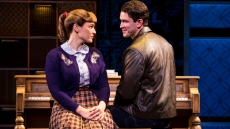The Cultch is pleased to present The Ceasefire Series. From Oct 30 – Nov 17, The Cultch’s three venues will be fully immersed with three shows that explore the causes, effects, and traumas of war from different lenses. The series features two Canadian premieres and a local world premiere from renowned playwright Amiel Gladstone.
On Nov 11, 1918 Allied and German officials signed the armistice that would end fighting on land, sea, and air. 100 years later as the anniversary of that armistice approached, Cultch Executive Director, Heather Redfern considered how she wanted The Cultch to engage with such a significant centenary. What resulted was the programming of three distinctly different shows; a high tech and interactive show about the ways modern young men (in particular) are recruited online, verbatim reflections from soldiers and nurses in WWI, and the world premiere a show with seven young women performing a play about prisoners in Stalag Luft III—the famous WWII POW camp—who put on theatre to maintain morale.
Details for the individual Ceasefire Series shows are below:
THE BELIEVERS ARE BUT BROTHERS
Javaad Alipoor and Kirsty Housley (UK), part of Diwali in BC
WHEN: Oct 30 – Nov 10, 2018
Oct 30, 8PM: Opening
Oct 31 – Nov 03, Nov 06 – 10, 8PM
Nov 03-04 & 10, 2PM
Nov 04, 7PM
WHERE: Vancity Culture Lab, 1895 Venables Street
TICKETS: Tickets $35. Single tickets on sale now through The Cultch’s Box Office: 604-251-1363 or tickets.thecultch.com. See all three Ceasefire Series shows for as low as $65 with The Cultch’s Choose 3 Subscription package.
Canadian Premiere. An electronic maze of fantasists, meme culture, 4chan, the alt-right, and ISIS. We live in a time where old orders are collapsing: from the postcolonial nation states of the Middle East, to the EU and the American election. Through it all, tech-savvy and extremist groups rip up political certainties. Amidst this, a generation of young men find themselves burning with resentment, without the money, power, and sex they think they deserve. With phones in hand, and interactive elements taking place through WhatsApp, audiences participate in this bold one-man show that explores the smoke and mirrors world of online extremism, anonymity, and hate speech.
SMALL WAR
SKaGeN (Belgium), Richard Jordan Productions & Theatre Royal Plymouth (UK)
Nov 06, 8PM: Preview
Nov 07, 8PM: Opening Night
Nov 08 – 10, 8PM
Nov 11, 2PM
WHERE: York Theatre, 639 Commercial Drive.
TICKETS: Tickets from $24. Single tickets on sale now through The Cultch’s Box Office: 604-251-1363 or tickets.thecultch.com. See all three Ceasefire Series shows for as low as $65 with The Cultch’s Choose 3 Subscription package.
Canadian Premiere. Small WaR looks at the man-on-the-ground and the consequences of what our leaders tell us. Through verbatim reflections from soldiers and nurses in WWI, we discover the human cost of conflict. No row of mics this time, just performer Valentijn Dhaenens—five times over—with a projection screen spanning the entire width of the stage. We find ourselves inside the room of a dying frontline soldier who, together with the nurse, looks back at his life and the why and wherefore of warmongering. SmallWaR is an emotional reflection on the trauma and the repetitiveness of war, concentrating on the deadlock instead of the action.
THREE WINTERS
Written and Directed by Amiel Gladstone (Vancouver)
WHEN: Nov 7–17, 2018
Nov 07, 8PM: Preview
Nov 08, 8PM: Opening
Nov 09 – 10, 13 – 17, 8PM
Nov 10 – 11, 2PM
WHERE: Historic Theatre, 1895 Venables Street.
TICKETS: Tickets from $24. Single tickets on sale now through The Cultch’s Box Office: 604-251-1363 or tickets.thecultch.com. See all three Ceasefire Series shows for as low as $65 with The Cultch’s Choose 3 Subscription package.
World Premiere. Throughout art and history, the biggest roles and adventures have been given to men. Not in this play—a fictional re-contextualization of real-life events. In Three Winters, a troupe of seven millennial actresses play WWII soldiers captured in the Stalag Luft III POW camp. Those men not only infamously hatched escape plans—immortalized by 1963 film, The Great Escape, they performed plays sent by the Red Cross, which required the men to play both male and female parts. When these historical events are acted by modern young women, not out of circumstantial necessity, but by choice, Three Winters asks audiences to question their assumptions about who we allow to play what parts and why.


